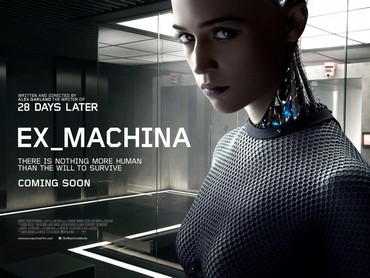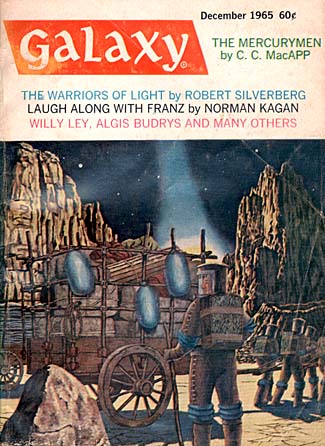A young programmer, Caleb Smith, wins a chance to not only visit a billionaire technology genius, Nathan Bateman, but also determine if Bateman has invented a machine, Ava, that passes the Turing test: Is it sentient? Ava enlists the Smith's aid in attempting to free it from its confines.Summary:
The film may not expand your thoughts on AI, but it may challenge your ethics. It's a simple film though that belies some of its complexity. Worth a watch to decide what you think. Avoid reading on if you don't like your movies spoiled.
Discussion:Smith undermines Bateman's security system so Ava can get out. The electricity goes down, and Ava escapes. She has a conversation with another AI which may be to premediate murder. The Kyoko AI carries a knife. Ava attacks first. When Bateman gets the upper hand, breaking its arm., Kyoko stabs Bateman in the back. After he strikes off Kyoko's jaw, Ava stabs Bateman in the heart.
Ava tells Smith to wait for her. Since she has told him that she wanted to be with him, he waits. However, after she dresses in other machine's parts to make her look more human, she leaves Smith locked up and makes her escape without him or Kyoko or Bateman.
Apparently, some critics love the movie as they deem it about feminism. This interpretation is problematic in at least three regards: 1) Ava is a machine. Most women would not choose to be considered machines. 2) Ava is a killer without conscience. Ava has doomed three beings to their deaths or imprisonment, without regard as to whether each deserves this fate: Smith, Bateman, and Kyoko. 3) Ava is created, rather than a creator.
A second interpretation is that Ava is successfully sentient and deserves freedom. We leave Ava on the street watching people as it has most desired. While it may be sentient, it has little or no regard for sentience other than its own. Plenty of sentient humans have chosen a similar path: "Destroy lives/careers of anyone in my path."
One might debate whether Bateman deserved death. Perhaps he was unaware of his machines' sentience. Yet he does have an ethos. He did not kill Smith or Ava or Kyoko. Rather, he disabled them. This may seem minor since he had destroyed earlier models. But what if they were problematic, such as AI models who lacked an ethical framework, unable to view other sentience as having as much right to exist as itself? In fact, Bateman's locking up and destroying his models seems to have some ethical backing, especially in light of Ava's behavior. Whether he ought to have destroyed their consciousnesses completely is one question, but maybe he did the world a favor. These AI were not ready for general circulation among humans.
This leads us to the third interpretation: This is a horror story. What seems a kind and gentle AI is freed by a do-gooder. The only problem is that the machine lacks a conscience--something left out of Smith's equation. In fact, it smiles when Bateman has his back to Kyoko, perhaps anticipating a knife in the back with some relish. The story does not build up atmosphere like a horror story, but the implied doom of the world is there like any classic Lovecraftian fiction.
 The movie title perhaps suggests the second interpretation: "Ex machina" (formerly a machine). It might refer to the Latin Deus ex machina as gods comes from machines although this possibility seems a little more remote as there is little discussion of gods. The British subtitle--"There is nothing more human than the will to survive"--points to the second interpretation, giving away the game entirely, if the director, Alex Garland, had a hand in writing or okaying this subtitle.
The movie title perhaps suggests the second interpretation: "Ex machina" (formerly a machine). It might refer to the Latin Deus ex machina as gods comes from machines although this possibility seems a little more remote as there is little discussion of gods. The British subtitle--"There is nothing more human than the will to survive"--points to the second interpretation, giving away the game entirely, if the director, Alex Garland, had a hand in writing or okaying this subtitle.On the other hand, a great deal of time is spent on Ava's stripping old models of their human features to wear as its own. It seems unconcerned about stripping other models of their humanity (the third interpretation). Or possibly it is its moment to become human (second interpretation). But that begs the question of what it was before.
On the other other hand, the film's last moment seems to be a glorying in freedom, suggesting nothing in visuals or soundtrack that anything is awry, but maybe that is an intentional contrast. We do witness the world upside down, looking at shadows rather than human bodies. There is still a glass between the viewers and Ava... although no glass between itself and humans walking by. Perhaps we, too, are helpless to change events, trapped on the other side of the glass.






